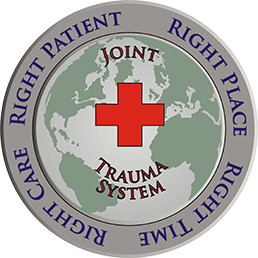Overview
The JTS conducts pre-deployment training of the US Central Command, Joint Theater Trauma System (JTTS) teams, DoDTR user training, and JTS staff training. The Education Branch facilitates the development of educational products for Combatant Command trauma system. The group also coordinates and manages continuing education opportunities and performance improvement courses.
Continuing Education Programs
JTS offers clinicians, nurses and medics the ability to earn Continuing Education (CE) credits to maintain certification and licenses even while deployed. Between SEP 2012 and SEP 2017, JTS provided 19,928 Continuing Medical Education (CME) and Continuing Nursing Education (CNE) credits to physicians and nurses who participated in the multidisciplinary weekly/monthly telemedicine conferences. The JTS Combat Casualty Care Curriculum (CCCC) Conference provided 18915.25 CME and CNE credits. The JTS Committee on Tactical Combat Casualty Care provided 360.75 CME and CNE credits. The JTS Committees on Surgical and Enroute Combat Casualty Care provided 624.5 CME and CNE credits. Video teleconferences keep remote users up to date on the latest techniques, clinical guidelines, policy updates, research initiatives, and met licensure/board requirements. Annually, there were 76.75 CE's credits available for physicians, nurses, and medics to earn per provider.
The JTS Combat Casualty Care Curriculum (CCCC) Conference
JTS Education and Performance Improvement teams provide cases and educational topics for discussion related to care practices and document variations at global CCCC teleconferences. JTS has presented over 587 video teleconferences discussing over 3,788 trauma patients to included JTS CCCC, Armed Forces Medical Examiner and Pacific Command conference. Multiple sites around the globe participate weekly in discussions of recently evacuated casualties from point of injury through each level of care and follow the selected patients through their rehabilitative phase. Following the clinical discussion, subject matter experts present trauma-specific topics to drive advancements and promulgate JTS Clinical Practice Guidelines. The ability to capture lessons learned on the battlefield for the next generation of trauma surgeons, nurses, pre-hospital providers, and key administrators has contributed to trauma care improvements and military medical readiness.

